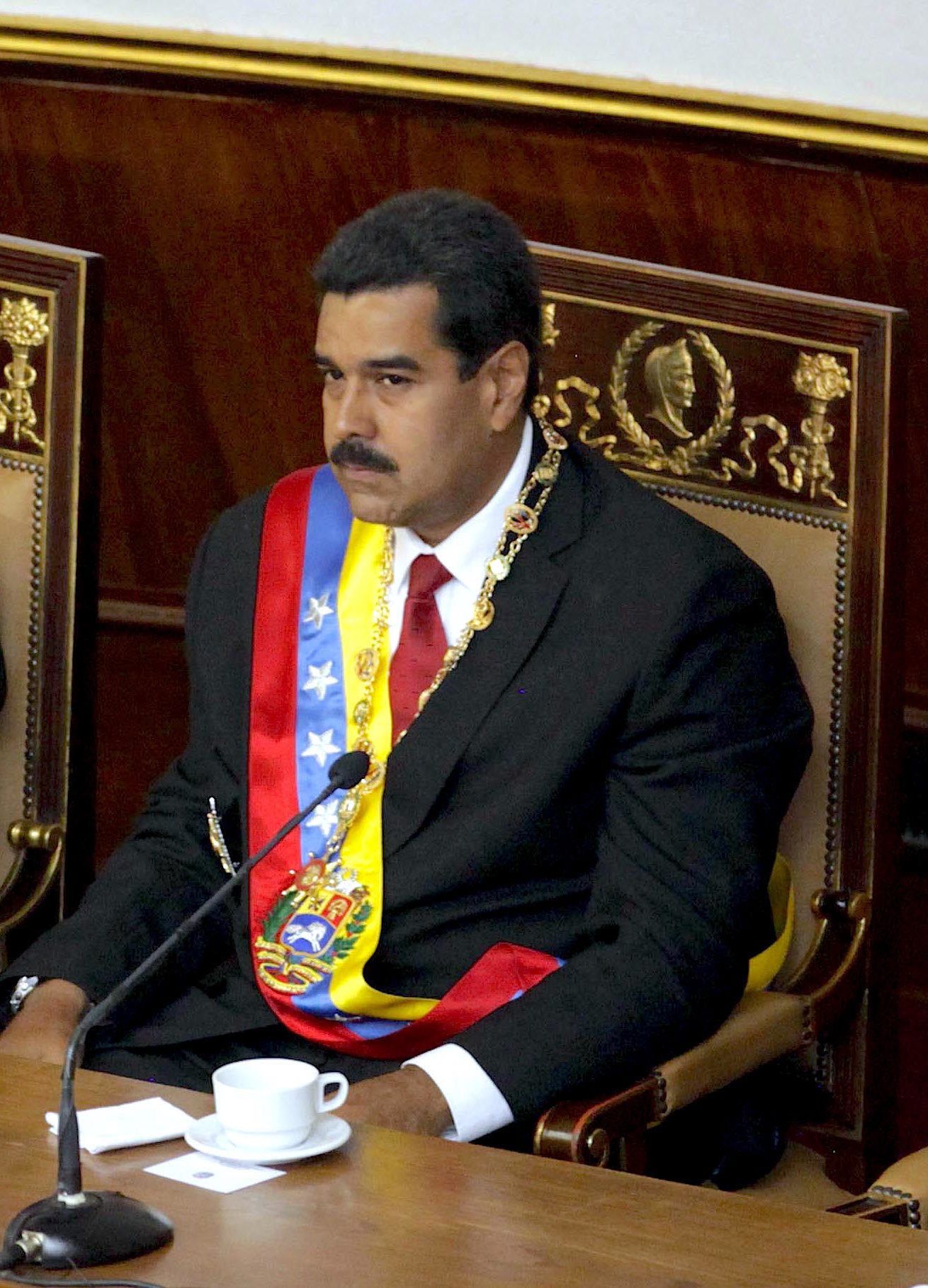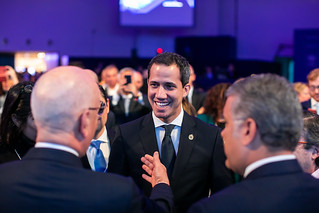
Featured image: Nicolás Maduro assuming office, 2013 (Source: Wikimedia Commons)
By: Mao Shiotsu
Read the pdf of the article here
“A minimum wage won’t give you enough to buy a kilogram of meat, let alone medicine,” says Paola Zerpa, a Venezuelan national studying engineering at the University of Texas. Human Rights Watch reports that hyperinflation has left around 80 percent of the population food insecure. But rising up against the inept Maduro regime is dangerous— the colectivos, an armed government force, harshly crack down on protests. Since 2014, over three million Venezuelans have fled this reality. That’s almost ten percent of the country’s population.
To make matters worse, it’s not clear who the president is. Is it Nicolás Maduro, Hugo Chávez’s socialist successor, or Juan Guaidó, the relatively new face from the progressive Voluntad Popular party? Government opposition parties boycotted the May 2018 Venezuelan presidential election, accusing Maduro of bringing the election forward to his advantage and persecuting political opponents. With only about 30% of eligible voters having voted, as reported by BBC, Maduro won a second term of presidency. The opposition rejected this outcome. In January of last year, Guaidó, speaker of the National Assembly, claimed himself the rightful interim president of Venezuela. There have seemingly been two presidents ever since.
“Guaidó was a symbol of hope (for many of the Venezuelan public) when he was declared interim president, but it quickly faded and nothing really changed,” Zerpa says. Indeed, the self-declared interim president has failed to produce significant results in the past year. Power still lies with Maduro and his loyalists occupying government, a truth laid painstakingly bare in February last year when Guaidó’s plans to deliver supplies to the public were barred by Maduro, and also three months later when his coup attempt failed.
Aware of this power imbalance, Guaidó has turned to the international community for help— most notably the US, one of fifty countries recognizing his government as legitimate. In the World Economic Forum held earlier this year, Guaidó, speaking amongst the likes of Angela Merkel and Greta Thunberg, asserted, “Por eso estoy aquí hoy. Para que ningunos de ustedes deje a Venezuela fuera. (That’s why I’m here today. So that none of you leave Venezuela out).”
International intervention in Venezuela so far has mainly manifested in the form of economic sanctions levied by the US, as well as targeted sanctions against Maduro’s government officials by some EU states. Earlier this month, President Trump met with Guaidó at the White House, where he “pledged more action to ramp up pressure” on Maduro, as reported by CNN. What these “action(s)” entail is not clear. Perhaps harsher sanctions, or even military aid. But hang on— is the US’s increased interference truly beneficial to Venezuela? Should the US —and other states— interfere less? More? Should they at all?
In considering what foreign intervention should look like, one could examine whether some states have a moral responsibility to help others. Perhaps Spain, as Venezuela’s conqueror, has some responsibility to aid Venezuela. In Why Nations Fail: The Origins of Power, Prosperity, and Poverty, Daron Acemoglu and James A. Robinson argue that the reason for the current political and social turmoil in many Latin American states lies in their colonial history. Spanish conquistadors followed a specific method of colonization: capture the indigenous leader, install a Spaniard in their place, then extract wealth and labor from indigenous populations. This is the gist of the encomienda system. There were other similar systems in Latin America, such as the mita and repartimiento. For around three centuries, the Spanish gained wealth through these structures at the expense of the native population.
Acemoglu and Robinson claim that these oppressive systems laid the roots for the authoritarian governments that persist in Latin American countries today, going so far as to claim that the Spanish “stamped out the possibility of economic growth” in the places they colonized. “Extractive” institutions are defined as those where power is concentrated in the hands of a select few and equity and security are not ensured by the government, effectively preventing overall growth of the country. On the other hand, “inclusive” institutions create flourishing societies by securing economic competition and personal freedoms, therefore creating incentives for individuals to pursue innovation and education.
But Dr. Cristina Soriano, Associate Professor of History at Villanova University whose research focuses on revolutions and society in colonial Venezuela and Latin America, warns that we cannot be too quick to point fingers. Dr. Soriano cautions that to push responsibility only on the Spanish “without acknowledging the crucial participation” of other imperial actors during the 20th century —when Venezuela became an oil-producing country— “seems a little simplistic and shortsighted.” True, claiming that all colonial powers are responsible for the state of their previous colonies does seem overly simplified. After all, the current condition of every country can be traced back to a part of its history.

Then perhaps foreign countries have a different moral responsibility to provide aid: goodwill. But the other, sinister side of this coin becomes obvious when considering why the US is so keen on asserting its support for the liberal Guaidó: imperial interests. The superpower’s interference in overthrowing governments in Latin America, or, its “backyard,” as former Secretary of State John Kerry put it, followed by the installation of US-friendly regimes is a repeating pattern— take Panama and Bolivia. Thus, it seems that the US’s support for Guaidó is merely a grab for power over its “backyard,” disguised as a fight for justice for the Venezuelan people. According to Dr. Alejandro Velasco, Associate Professor of History at NYU specializing in Venezuelan history, and Editor in Chief of NACLA (North American Congress on Latin America)’s news site, Venezuela has even become a “mini-Cuba,” a “useful domestic political tool” for US governments to gain domestic votes. These veiled motivations further complicate the question of how foreign states should provide aid.
Dr. Velasco proposes an intriguing approach: differentiating between international “intervention” and “engagement.” “Intervention” connotes foreign states picking sides to further their own interests. It’s what’s currently happening— the US and many EU states support Guaidó. Russia, China, and Cuba support Maduro. This is counterproductive. US economic sanctions may have pressured Maduro, but they’ve also arguably worsened living conditions for citizens by further damaging the economy. Instead, foreign powers must “engage” in the crisis. They must aid Venezuela, not by promoting what they arrogantly believe the country needs, but by providing support to advance the public’s best interests. They must prioritize Venezuela’s autonomy.
The international community must also recognize the Venezuelan population’s opinions on foreign interference. Professor Sebastian Díaz, Venezuelan professor of Spanish at Yale, comments that the Venezuelan population’s views split largely into two. One group believes that a democratic and peaceful election is the best way to strip Maduro of power, and therefore does not want international help, fearing that it will bring unnecessary bloodshed. The other group regards democratic elections as unrealistic, and trusts that the only way to overthrow the dictatorship is through violence backed by foreign countries. Paola claims that it will require “the Venezuelan people and military unifying to drive out those currently in power and have democratic elections.”
Thus, the general consensus is that for Venezuela to recover from the crisis and for the Venezuelan public to feel safe in their own country, Maduro’s dictatorship needs to end. The most bloodless avenue seems to be a peaceful handover of power through democratic elections. The belief that this is unrealistic is reasonable judging from past Venezuelan elections, for example in May 2018 when opposition parties boycotted the election. But as Dr. Velasco asserts, perhaps it’s not about whether it’s realistic, but “whether it’s necessary.” Many of the past US military intrusion in Latin American politics have failed spectacularly in creating long-term stable democracies. Thus, military intervention is out of the question when considering Venezuela’s best interests. What’s necessary seems to be for the Venezuelan population to collectively elect a new president, and for Maduro to peacefully hand over power to the newly elected government.
Perhaps this is where the international community can step in. They could apply smart pressure to ensure that Maduro, should he lose the election, step down without creating trouble. This should be done not through arbitrary sanctions and promises of help that stem from imperial incentives, but through policies targeted towards securing Venezuela’s long-term stability, such as multilateral election monitoring. But what if Maduro wins the election? This outcome is plausible— due to the spiraling economy, he has announced the reintroduction of liberalizing policies, such as securing private property. Perhaps these will stabilize Venezuela’s economy and allow Maduro to continue to hold on to power. In that case, as long as the elections were held democratically, foreign powers must not interfere. Otherwise, Venezuela will become yet another battling ground for the world’s imperial actors.
Mao Shiotsu is a first-year in Jonathan Edwards College. You can contact her at mao.shiotsu@yale.edu.